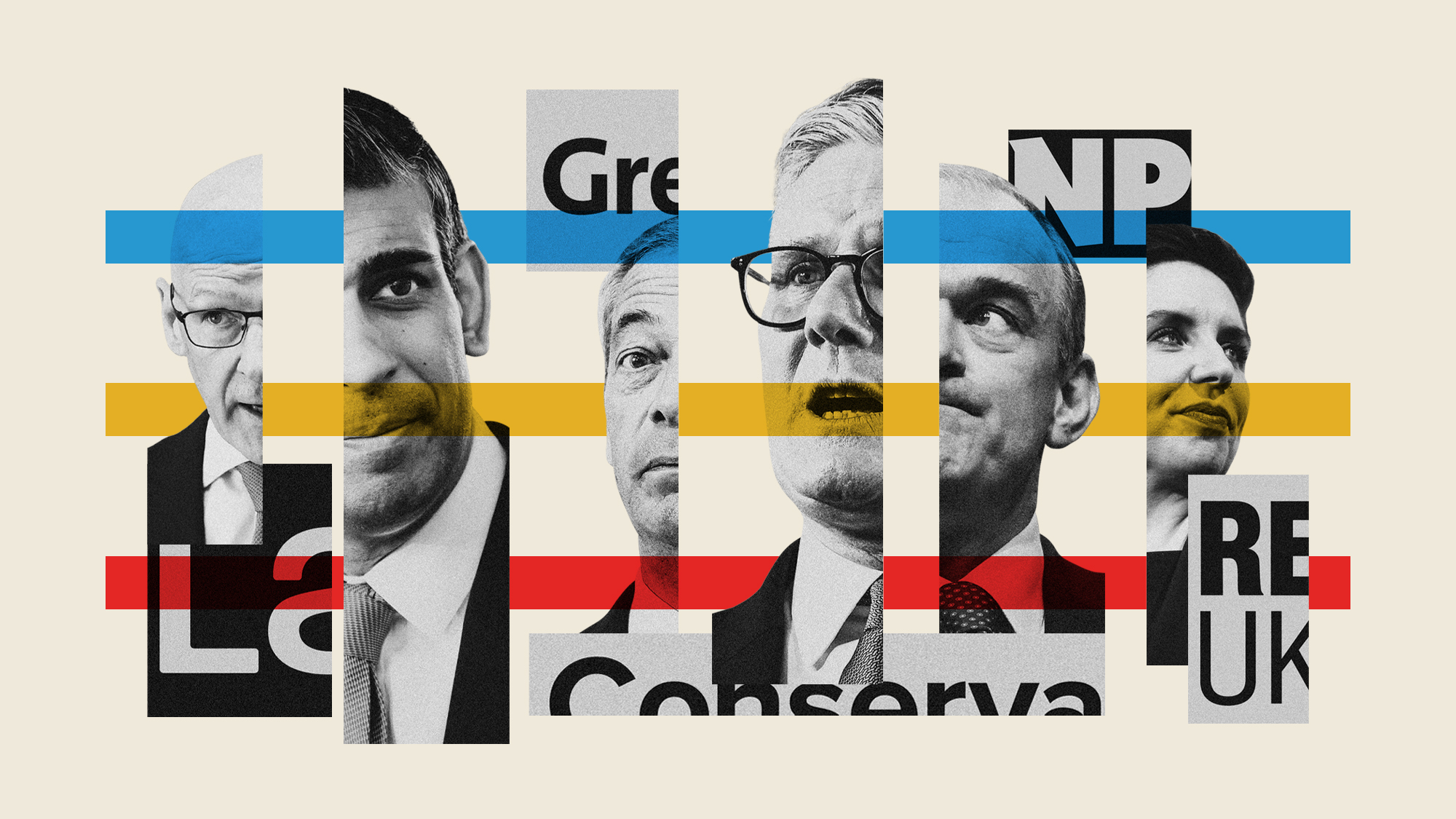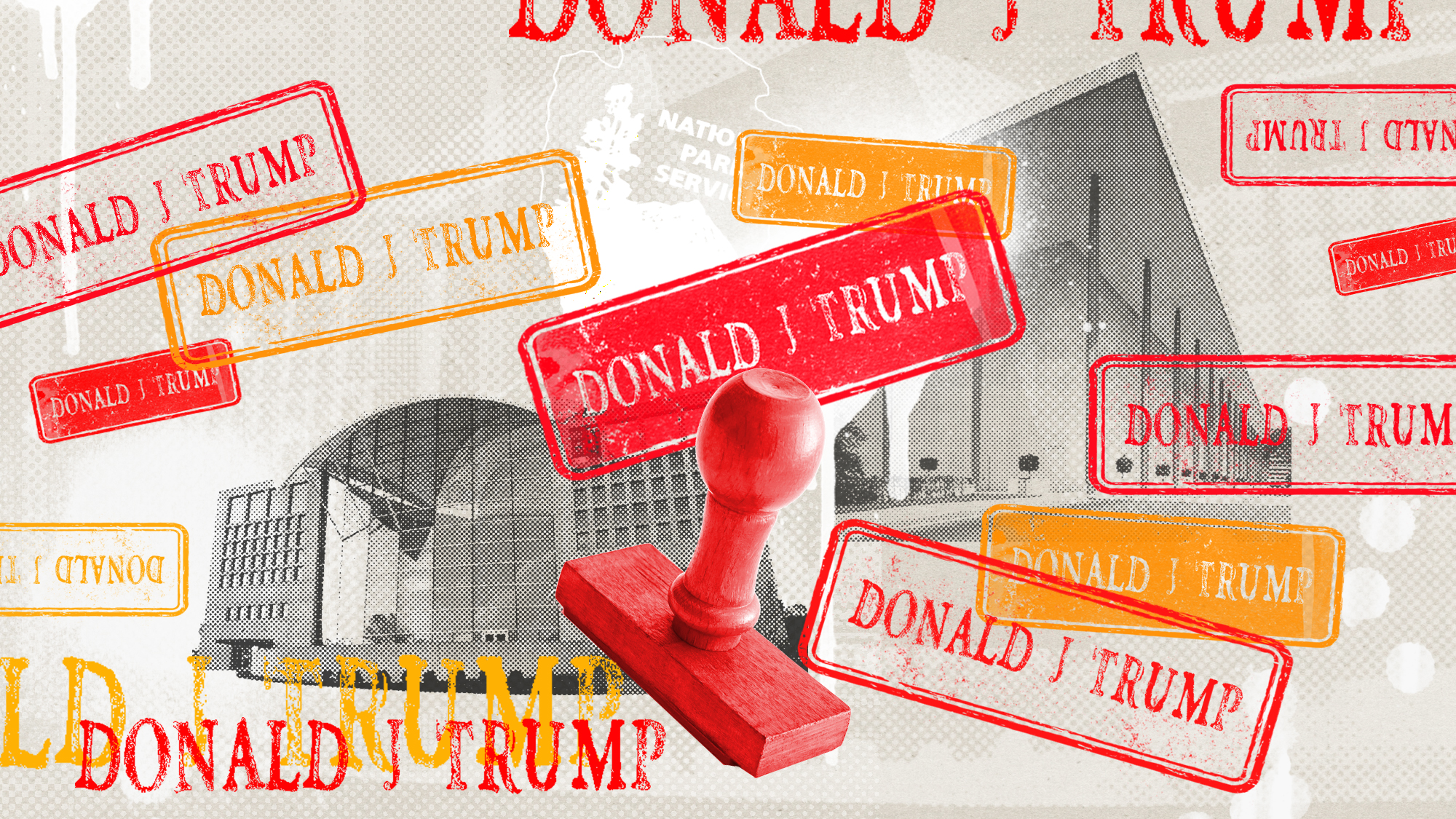General election manifestos: how the main parties compare
Labour and the Tories 'leave voters guessing over policy on tax and spending'

A free daily email with the biggest news stories of the day – and the best features from TheWeek.com
You are now subscribed
Your newsletter sign-up was successful
Millions of voters are heading to polling stations around the country today to choose who will represent them in 650 constituencies.
The political parties have spent six weeks on a campaign trail filled with policy pledges, hustings and energetic photocalls from the Lib Dem leader Ed Davey.
The polls suggest Labour is on course for a huge majority, but nobody will know for sure until the final results are called. While the smaller parties are vying to be the "third party" in the House of Commons rather than leading the country, manifestos from parties such as the Greens and Reform UK offer a flavour of what they might push for in opposition.
The Week
Escape your echo chamber. Get the facts behind the news, plus analysis from multiple perspectives.

Sign up for The Week's Free Newsletters
From our morning news briefing to a weekly Good News Newsletter, get the best of The Week delivered directly to your inbox.
From our morning news briefing to a weekly Good News Newsletter, get the best of The Week delivered directly to your inbox.
Labour Party
Labour leader Keir Starmer acknowledged there were few surprises and "no rabbit out of the hat" policy announcements when he launched his party's manifesto.
The party has pledged to cut NHS waiting times by delivering 40,000 more appointments each week on evenings and weekends, paid for by "cracking down" on tax avoidance. It wants to launch what it calls a new Border Security Command, using specialist investigators and counter-terrorism powers to "smash criminal boat gangs".
A centrepiece of Labour's manifesto is a promise to create a publicly owned company called Great British Energy to invest in new renewable energy projects, with £8.3 billion being committed over the next five years.
Other key pledges include a promise to recruit 6,500 teachers in key subjects where there are shortages, such as maths, physics and computer science. Labour says it will open an additional 3,000 nurseries "through upgrading space in primary schools", as well as providing a free breakfast club in every primary school.
A free daily email with the biggest news stories of the day – and the best features from TheWeek.com
The party has committed to votes for 16- and 17-year-olds, a policy it says will "increase the engagement of young people in our vibrant democracy".
Labour has said it will not raise personal tax rates to fund its manifesto commitments, with the plans instead paid for by raising £8 billion through putting VAT on private school fees, clamping down on those who are underpaying tax and a windfall tax on oil and gas companies.
But the BBC's chief economics correspondent, Dharshini David, said there remained "much uncertainty about the amount these sources can raise and the assumptions that underpin the numbers".
Indeed, the manifestos of the two main parties "leave voters guessing over policy on tax and spending", said Paul Johnson, director of the Institute for Fiscal Studies (IFS). Whoever wins will face a "stark choice": raise taxes by more than they have promised, cut public spending or borrow more. "That is the trilemma."
Conservative Party
The abolition of National Insurance (NI) for the self-employed was one of the few policies that had not been briefed to the press ahead of the Conservatives' manifesto launch. Currently the self-employed – of which there are more than 4 million in the UK – pay 6% on profits between £12,570 and £50,270 and 2% above £50,270.
The Conservatives also plan to cut NI for employees by a further 2p by 2027, which is in addition to the 4p already cut this year. The Tories say they will pay for these policies through welfare reforms, which they say will save £12 billion. However, the independent IFS has said that making such savings "looks difficult in the extreme".
The Tories have promised to introduce a "triple lock plus" for pensioners, by increasing the personal tax-free allowance for them. The allowance would rise by whichever is highest out of inflation, wage growth or 2.5%.
The manifesto includes a pledge to build 1.6 million new homes over the next parliament, although the party had a similar pledge in 2019, which it failed to deliver.
For those looking to get on the property ladder for the first time, the Conservatives plan to launch a £1 billion scheme that would allow first-time buyers with government-backed mortgages to buy a home with just a 5% deposit. Modelled on the recently closed Help to Buy scheme, it can be used for home purchases under £400,000.
The manifesto also commits to ensuring a "regular rhythm of flights every month" to Rwanda, starting in July.
Liberal Democrats
The Liberal Democrats were the first party to officially launch its manifesto, which centres on an £8.4 billion package to improve the NHS and social care.
The party has pledged 8,000 more GPs in England to ensure everyone has the right to see a doctor within seven days, or 24 hours for urgent care. The Lib Dems also plan to introduce free personal care for the disabled and elderly in England, in a system similar to that already operating in Scotland.
Further health pledges for England include a guarantee that all cancer patients would start treatment within 62 days of urgent referral, as well as guaranteed access to an NHS dentist for anyone needing emergency care.
On housing, the party has committed to building 380,000 new homes a year across the UK, including 150,000 social housing units. This would be done through the creation of 10 new "garden cities" as well as "community-led" development.
The party has said it would scrap the government's controversial Rwanda scheme entirely and "provide safe and legal routes" for asylum seekers. It would scrap the current salary threshold for migrant workers and replace it with a "merit-based" system. The party promises to end the recently introduced ban on foreign care workers bringing dependents to the UK as well as reversing the increase in income thresholds for family visas.
Reform UK
Reform UK's official manifesto – entitled "Our Contract With You" – is "short on details", said Politico, but pitches several "critical reforms" it says would be needed within 100 days of a new government taking office.
Chief among these is the party's flagship pledge to "stop the boats" as part of a four-point plan to curb illegal immigration. This would include taking the UK out of the European Convention on Human Rights, setting up a new department for immigration and freezing "non-essential" legal migration.
It will aim to ease the tax burden by raising the income tax threshold to £20,000, while also scrapping inheritance tax on estates under £2 million. Plans to abolish VAT on energy bills, lift the VAT threshold on businesses to £150,000, and cut fuel duty and corporation tax would be paid for by a £50 billion a year reduction in government spending – working out at around £5 in every £100.
The manifesto proposes scrapping net zero plans and green levies to bring down energy bills while increasing drilling for gas and oil. The party would introduce a patriotic curriculum in primary and secondary schools that banned the teaching of "woke" and "transgender ideology".
Under its healthcare plans, Reform would exempt all front-line healthcare and social care workers from the basic rate of income tax for three years, and offer 20% tax relief on all private healthcare and insurance. It would also enforce a two-strike rule for job seekers on benefits and hold a referendum on changing the voting system.
Scottish National Party (SNP)
The Scottish National Party was the last major party to launch its election manifesto and unsurprisingly put independence front and centre.
It advances the independence policy agreed at the SNP's conference last year, whereby winning a majority of the 57 Westminster seats up for grabs in Scotland would be treated as licence to begin negotiations with the UK government "to give democratic effect to Scotland becoming an independent country".
Newly installed SNP leader John Swinney has "attempted to paper over some of the party's yawning divisions" in the manifesto, said the BBC. However, the document is "thin and amounted to only 32 pages, three of which are completely blank", said The Telegraph.
Among pledges that are included are a demand for the "full devolution" of tax powers to Holyrood so that more cash can be raised. It also endorsed a series of windfall taxes on Scottish businesses and backed Labour's plans to impose VAT on private schools.
The SNP has demanded that the UK government pump an extra £10 billion annually into the NHS, claiming this would "address rampant inflationary pressures and improve performance". But in stark contrast to Labour it has vowed to scrap the two-child benefit cap as well as the Trident nuclear deterrent. It also wants to "reverse the damage of Brexit and re-enter the single market restoring free movement for EU citizens", but acknowledges the UK will not be rejoining the EU. Instead, the manifesto emphasises a "vision for an independent Scotland in the EU".
Green Party
The Green Party, which is targeting four seats, is building on its "expansion beyond its environment and climate focus to become a left-wing foil to Labour", said the Financial Times.
Co-leaders Carla Denyer and Adrian Ramsay are promising a "greener, fairer country" in which "we are all safer, happier and more fulfilled". To deliver it, they are promising a massive investment of an additional £8 billion of NHS annual expenditure within the first year of the next parliament, which will increase to £28 billion by 2030. Doing so, they say, will help to cut waiting lists, guarantee access to NHS dentists and urgent access to GPs, and give NHS staff an immediate pay rise.
The Greens would push for a "green economic transformation", involving a carbon tax to reduce the economy's reliance on fossil fuels, nationalising railways and water companies, as well as the "big five retail energy companies", and investing £40 billion a year into shifting towards a green economy. The party would also aim for wind power to make up 70% of the UK's electricity by the end of the decade, and removing all oil and gas subsidies, as well as cancelling recently agreed fossil fuel licences.
Improving home insulation is key to their environmental and energy missions, with £29 billion promised over the next five years to insulate UK homes to an EPC B rating or above. The party has pledged to provide 150,000 new social homes every year, and for local authorities to be able to exercise rent controls.
Sorcha Bradley is a writer at The Week and a regular on “The Week Unwrapped” podcast. She worked at The Week magazine for a year and a half before taking up her current role with the digital team, where she mostly covers UK current affairs and politics. Before joining The Week, Sorcha worked at slow-news start-up Tortoise Media. She has also written for Sky News, The Sunday Times, the London Evening Standard and Grazia magazine, among other publications. She has a master’s in newspaper journalism from City, University of London, where she specialised in political journalism.
-
 Is Andrew’s arrest the end for the monarchy?
Is Andrew’s arrest the end for the monarchy?Today's Big Question The King has distanced the Royal Family from his disgraced brother but a ‘fit of revolutionary disgust’ could still wipe them out
-
 Quiz of The Week: 14 – 20 February
Quiz of The Week: 14 – 20 FebruaryQuiz Have you been paying attention to The Week’s news?
-
 The Week Unwrapped: Do the Freemasons have too much sway in the police force?
The Week Unwrapped: Do the Freemasons have too much sway in the police force?Podcast Plus, what does the growing popularity of prediction markets mean for the future? And why are UK film and TV workers struggling?
-
 A running list of everything Donald Trump’s administration, including the president, has said about his health
A running list of everything Donald Trump’s administration, including the president, has said about his healthIn Depth Some in the White House have claimed Trump has near-superhuman abilities
-
 How long can Keir Starmer last as Labour leader?
How long can Keir Starmer last as Labour leader?Today's Big Question Pathway to a coup ‘still unclear’ even as potential challengers begin manoeuvring into position
-
 The high street: Britain’s next political battleground?
The high street: Britain’s next political battleground?In the Spotlight Mass closure of shops and influx of organised crime are fuelling voter anger, and offer an opening for Reform UK
-
 A running list of everything Trump has named or renamed after himself
A running list of everything Trump has named or renamed after himselfIn Depth The Kennedy Center is the latest thing to be slapped with Trump’s name
-
 A running list of the international figures Donald Trump has pardoned
A running list of the international figures Donald Trump has pardonedin depth The president has grown bolder in flexing executive clemency powers beyond national borders
-
 A running list of US interventions in Latin America and the Caribbean after World War II
A running list of US interventions in Latin America and the Caribbean after World War IIin depth Nicolás Maduro isn’t the first regional leader to be toppled directly or indirectly by the US
-
 A running list of the US government figures Donald Trump has pardoned
A running list of the US government figures Donald Trump has pardonedin depth Clearing the slate for his favorite elected officials
-
 The MAGA civil war takes center stage at the Turning Point USA conference
The MAGA civil war takes center stage at the Turning Point USA conferenceIN THE SPOTLIGHT ‘Americafest 2025’ was a who’s who of right-wing heavyweights eager to settle scores and lay claim to the future of MAGA